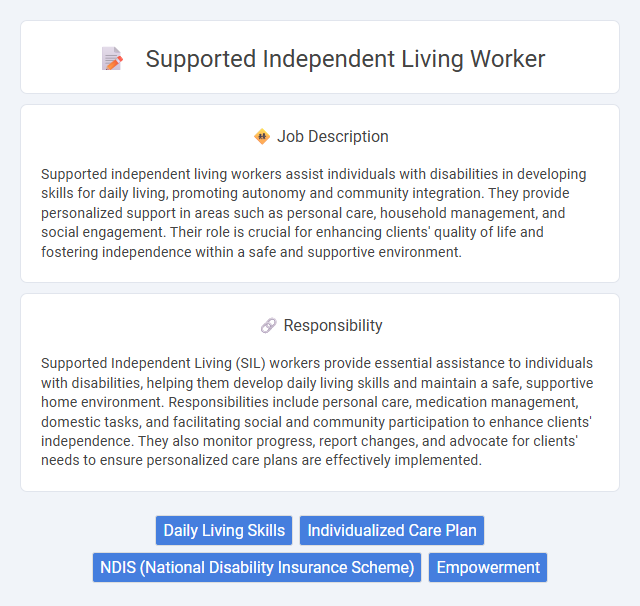
Supported independent living workers assist individuals with disabilities in developing skills for daily living, promoting autonomy and community integration. They provide personalized support in areas such as personal care, household management, and social engagement. Their role is crucial for enhancing clients' quality of life and fostering independence within a safe and supportive environment.
Supported independent living workers most likely assist individuals with disabilities or mental health conditions who require varying levels of support to maintain daily living skills and independence. Candidates with strong empathy, patience, and adaptability probably find this role suitable, as it involves providing personalized care and fostering independence in clients. Those uncomfortable with unpredictable environments or lacking communication skills may not find this job appropriate.
Qualification
Supported independent living workers require a combination of formal education and practical experience in disability support or community services. Essential qualifications often include a Certificate III or IV in Individual Support (Disability) or equivalent vocational training, along with first aid certification. Strong communication skills, empathy, and knowledge of person-centered care principles are critical to effectively assist clients in achieving independence.
Responsibility
Supported Independent Living (SIL) workers provide essential assistance to individuals with disabilities, helping them develop daily living skills and maintain a safe, supportive home environment. Responsibilities include personal care, medication management, domestic tasks, and facilitating social and community participation to enhance clients' independence. They also monitor progress, report changes, and advocate for clients' needs to ensure personalized care plans are effectively implemented.
Benefit
Supported independent living workers likely provide essential assistance to individuals aiming to live autonomously, which may enhance clients' confidence and quality of life. Their role probably contributes to fostering independence through personalized support, potentially reducing reliance on more intensive care services. Employment in this field might offer meaningful job satisfaction and opportunities for professional growth within the community care sector.
Challenge
Supporting independent living workers likely face challenges in balancing the diverse needs of clients while promoting autonomy and safety. They probably need to manage unpredictable situations, requiring quick problem-solving and emotional resilience. The role may demand adaptability to varying support levels, which can be mentally and physically taxing.
Career Advancement
Supported independent living workers acquire specialized skills in client care, communication, and independence facilitation, positioning themselves for career advancement in healthcare and social services. Progressive roles include team leader, coordinator, or case manager, offering increased responsibilities and higher salaries. Pursuing certifications or further education in disability support or social work enhances opportunities for promotion within this sector.
Key Terms
Daily Living Skills
Supported independent living workers assist individuals with daily living skills such as meal preparation, personal hygiene, medication management, and household chores to promote autonomy and improve quality of life. They create tailored support plans that address each client's specific needs and goals, ensuring consistency and progress in skill development. Continuous observation and encouragement help individuals build confidence and maintain independence within their living environment.
Individualized Care Plan
Supported independent living workers implement Individualized Care Plans tailored to the specific needs, preferences, and goals of each client, ensuring personalized support for daily living activities and skill development. They monitor progress and adjust care strategies in collaboration with healthcare professionals, family members, and clients to promote autonomy and well-being. Effective documentation and communication within multidisciplinary teams are essential for maintaining the quality and consistency of care provided.
NDIS (National Disability Insurance Scheme)
Supported independent living workers play a crucial role in delivering personalised care and support under the National Disability Insurance Scheme (NDIS), assisting participants with daily living activities to enhance their independence. They implement individualised care plans aligned with NDIS goals, promoting skill development, social inclusion, and community participation. Expertise in NDIS compliance, person-centred approaches, and adaptive communication strategies ensures effective support tailored to diverse disability needs.
Empowerment
Supported independent living workers play a crucial role in empowering individuals with disabilities by promoting autonomy and decision-making skills that enhance their quality of life. They provide personalized support tailored to each person's unique needs, enabling clients to develop daily living skills and build confidence in managing their own households. Through fostering independence, these workers help individuals achieve meaningful participation in their communities and greater self-determination.
 kuljobs.com
kuljobs.com